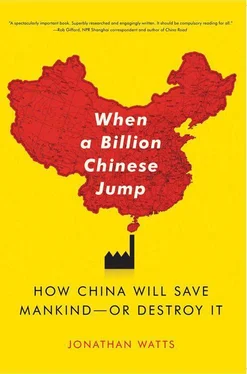The Hun and Pu rivers no longer run black and their banks are lined with trees thanks to a municipal greening campaign. In the north of the city, the Shenbei district has been developed with leafy streets and high-rises topped with solar panels. Nearby, another eco-city is being designed by Tongji University and U.S. architects. Farther south, the concrete campus at Shenyang Jianzhu University’s school of architecture has been brightened up by a grid of lush rice fields designed by the country’s leading landscape gardener, Yu Kongjian.
Yu’s book The Art of Survival sets forth one of the most lucid arguments for an ecological rethink of China’s development model. He traces the nation’s current problems back thousands of years to the first ornamental garden, an attempt to re-create the mythical Land of Peach Blossom at Yuanmingyuan, the summer palace. This vain attempt to improve upon nature, he told me, marked a move away from Taoist ideals. Instead of ecological productivity, he argued, leaders have foolishly spent two thousand years pursuing artifice and consumption. Cities were a symbol of that demise.
“The urbanization process we follow today is a path to death. Chinese culture kills people. It deprives people of productivity,” Yu said. “Yet, we carry on with this high culture. We enjoy Chinese gardens with their deformed trees. This is a sick aesthetic.”
The Harvard-trained landscape gardener’s mix of ancient tradition and radical modernity is immensely popular and increasingly influential in China. 20Yu’s company, Turenscape, is expanding. Government officials consult him about improving what he calls “ecological security,” a benevolently self-interested approach to the problem. Its essence is strikingly simple: Don’t fix the environment because it looks nice; fix it because your survival is at stake.
Yu advocates restoring natural watercourses, cultivating wild grasses, and rebuilding the “eco-infrastructure.” He has declared war on concrete, which he tears up whenever possible. Essentially, he is ordering a strategic retreat by mankind, giving nature the chance to restore itself. His landscaped areas certainly look more attractive than most urban planning of the past fifty years. 21They are also more productive. At the architecture school in Shenyang, students now plant seedlings every May in the paddy fields he introduced.
“I was asked to do something that was beautiful and unique. So I said, why not grow rice? It costs nothing and it is beautiful in three months,” Yu explained in fluent English. “The long-lost tradition of rice culture becomes part of campus culture.” Some of the crop is gift-wrapped for visitors. The rest is left for the birds. “To give something back to nature,” as Yu put it.
I watched as clouds of sparrows flew back and forth between the trees and bushes in the campus, lightening the atmosphere with twittering and movement. China’s environmental thinking had come a long way since Mao declared a sparrow-extermination campaign during the Great Leap Forward. 22
But the legacy of grim materialism still dominated the cityscape. For all of the recent improvements, Shenyang was still basically an ugly, gray, inefficient city. More than the environment, most residents were interested in earning a good salary and improving their living standards. That usually meant bigger homes, more appliances, and a growing hunger for energy. Over the previous decade, Shenyang’s urban population had crept above the 5 million mark and the size of the average home had almost tripled. Those extra people in those bigger houses liked to be two degrees warmer in the winter and two degrees cooler in the summer than ten years earlier, which meant more electricity had to be generated for heaters and air conditioners, not to mention their bigger televisions, refrigerators, freezers, and microwave ovens. As was the case across much of the nation, the housing stock was in dire condition. 23Building materials were hugely energy-inefficient compared with the more expensive ones used in the West. 24Solving these problems would necessitate strong leadership at the top of society, a change of values at the bottom, and incentives for businessmen in the middle to make money by selling green products. I met a consultant trying to realize all three.
Dongbei folk tend to be of the hearty variety with a reputation as straight talkers and heavy drinkers. Wang Zhenxin fitted at least part of the stereotype. The Shenyang People’s Congress representative had a bluff charisma that would serve him well if democracy ever came to China and forced him to face a popular vote. Without that distraction, he was devoting his efforts to the building of a green energy company.
Like many start-ups, his firm, Xindi Consulting, was a hodgepodge of projects ranging from photovoltaic-walled apartment blocks in the city center to fruit plantations for biomass production in the desert. With barely half a dozen staff, most of them recent university graduates, the firm was full of dynamism but short of personnel. Wang was sufficiently larger than life to fill in the gaps. He served as president, inventor, consultant, and investment manager. He was also the chief lobbyist, using his political position to put pressure on the government to buy solar.
“In China, bottom-up change is impossible, so nothing gets done unless leaders understand the problems. But they don’t listen. You have to tell them again and again,” he said with a smile. “The People’s Congress demanded meetings on solar power every ten days until the government relented. Soon after that, they ordered an extra 150,000 panels.” The water in more than one in every twenty homes in Shenyang was now heated by solar power, and the city had set one of the most ambitious targets in China for expansion of this form of renewable energy. 25
But Wang’s proudest achievement as a legislator was the proposal in 2000 of a bill to allow residents independent control of the heating in their houses. This was a radical step away from a fundamental tenet of communism that everyone should be exactly as warm as everyone else. Throughout northern China, public heating comes on line on November 15 and switches off on March 15, regardless of the temperature. 26The waste is phenomenal. On warm winter days, many people open their windows because it is the only control they have over the heat inside their homes. Wang wanted to end this with a metering system. But his moment of glory was not to be: his bill was amended at the last moment when it was decreed that householders should have neither knowledge nor control of their energy consumption. The proposal for individual meters was blocked. All that was new was an external on-off switch for each house that would make it easier for the power company to cut off individual supplies for nonpayment of bills.
“The system was changed for the benefit of the management companies rather than the environment,” Wang said, shaking his head. “The managers didn’t want the heat measured because they thought the tenants might complain if some ended up paying more than others.”
He consoled himself with the thought that the failed legislation had at least raised awareness of the link between price and demand. But the failure of Wang’s bill encapsulates what has happened to the entire Chinese economy. Out has gone the “everyone-the-same” treatment of communism. In has come the “more-economic-activity-the-better” ethos of top-down capitalism. Individual consumers are not given the opportunity to make efficiency improvements that might weaken business growth or social stability. The environment is barely a consideration.
Wang suggested people were used to having their fate decided by others.
“When I was young we had no choice about our field of study. The Communist Party decided everything. I wanted to be a mathematician, but they enrolled me in university as an engineer. It was fate. I am glad now. Energy efficiency has become more and more important.”
Читать дальше










